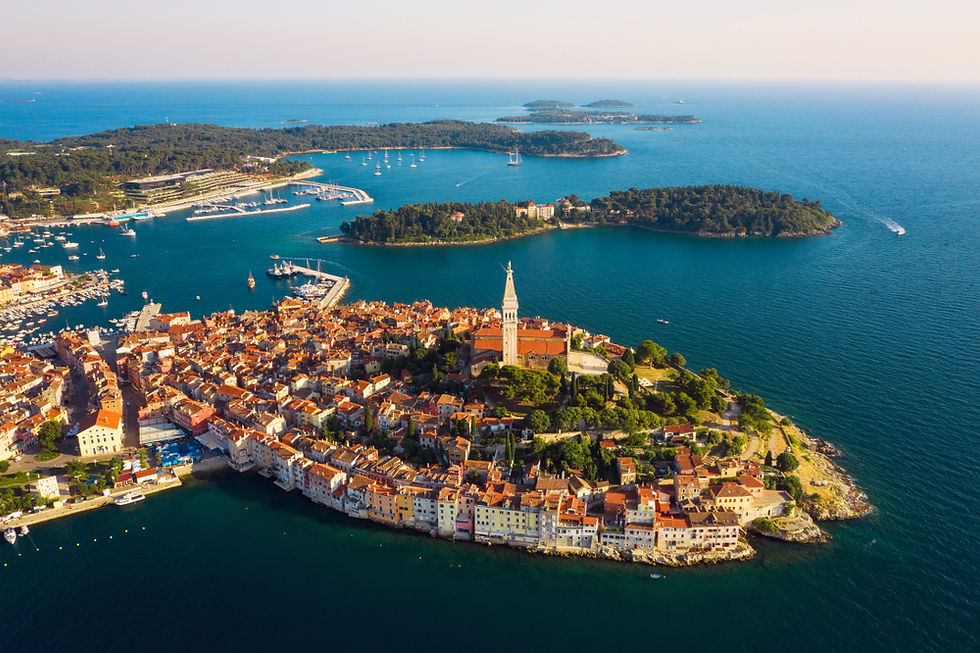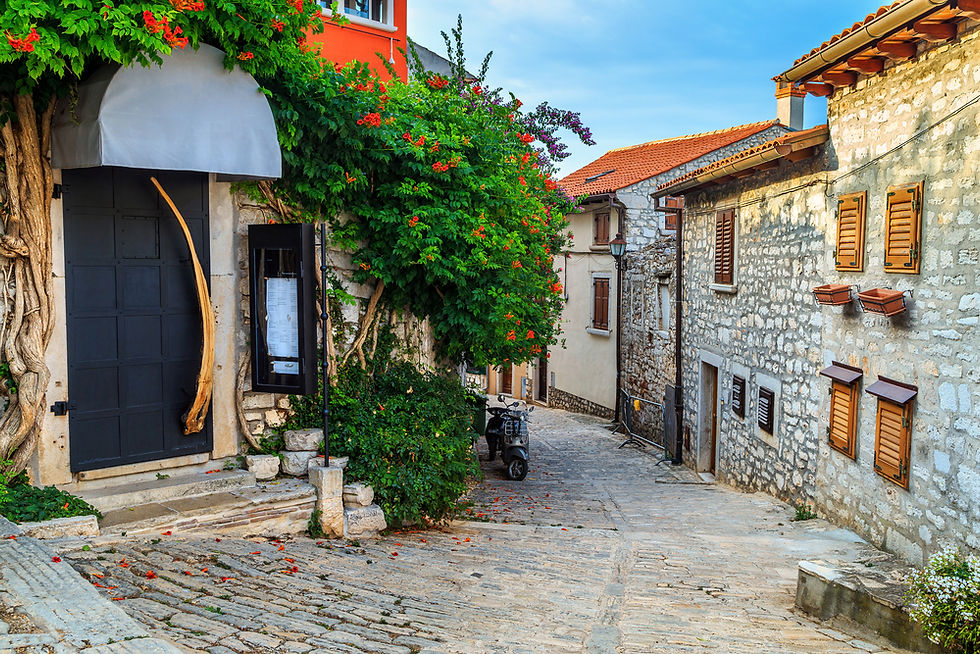Croatia: Why you should visit this laid-back and stunning Balkan state
- Tara Busch
- Jul 22, 2022
- 6 min read
Updated: Jan 9

Imagine a well-preserved Roman citadel, the chalk-colored stone walls, raised pearly columns, and terra cotta tiles on every roof… but it’s teeming with life, drenched in sunshine, and has all the ingredients for a small town. Where the narrow maze-like streets open to a gorgeous white stone plaza and locals casually sip strong coffee while chatting the morning away.
Now imagine this complex is set on the turquoise waters of a glittering sea, boats come and go, pleasure-seekers and fisherman vie for a buoy, and palms neatly line the promenade. Feel the salty afternoon breeze cooling your skin, wind laced with scents of Cyprus and pine as the sun sets over water reflecting on windows and bright walls creating the illusion it’s ablaze.
The crackle of coals heating up, preparing for the day’s catch to be roasted for diners soon to arrive. The clinking of glasses and plates fill the air as cafe goers overflow into the pedestrian only streets. Somewhere folks are singing traditional songs and dancing.
This might sound too flowery, for another place that might be true - but this place isn't like the others - this is the Dalmatian city of Split. UNESCO heritage site, hub for Adriatic island-hoppers, home to exceptional cuisine, and though not at all imaginary, being there most certainly invites a bit of daydreaming.
Split is just one of the incredible places we at Conscious Travel Collective love in Croatia!
We support travelers looking to travel slowly, seeking locally focused, absolutely stunning, and culturally rich places. All with the support of a trusted team behind you, to allow time to savor and take it all in in laid-back style.... nothing could be more Croatian!
While you’re dreaming of Croatia, we’ve crafted a bit on the history, culture and geography of this small, but diverse European country!
Why Visit?
Diverse Geography
When you think of Croatia, maybe you’re wondering, “weren’t they part of Yugoslavia? Italy? The Ottoman Empire? Austria-Hungary? Roman Empire? Ancient Greece?” - Why Yes! All are true, and more even!
Croatia is located on the Eastern shore of the Adriatic Sea with Italy and Slovenia its neighbor to the north, to the east is Hungary, Serbia and Bosnia, and the very far south borders Montenegro. The Dinaric Alps run straight through the country near the coast.
Yet perhaps its most impressive feature is the 1,000 + islands that span its coastline. The various misshapen bits of land resemble the mess left after a still powered on batter-soaked hand mixer is pulled too early from the bowl.
Islands small enough for a person to run across in under five minutes to others you might want to spend the rest of your life exploring. Some rocky and bare of vegetation, others rich with deep greens from the olive, pine and cypress trees that grow wild here.
Out of the entire archipelago of islands, only a few dozen are inhabited, and each one not dramatically like the other due to the long history of the people there, whose ancestors plowed, fished, and carved their legacies, rooting a subculture whose small, devoted population is brimming with pride still today.

Why Visit?
Croatian Cultural Regions
Croatia has five regions: The Capital Zagreb and surroundings, the rural eastern Slavonia, Kvarner is the central region whose interior is forest with rivers and lakes and coastal cities and islands are local favorites, the northern coast and peninsula of Istria has Italian roots, while the south is made up of Dalmatia.
Most travelers to Croatia will see only Dalmatia, home to a collection of large, populated islands, the Roman complex and Split and the stunning, well preserved, walled coastal city Dubrovnik (or for Game of Thrones fans, Kings Landing).
But this focus on the overexposed south is doing oneself a huge disservice, as each region has something very unique to offer.
Why Visit?
Preservation & UNESCO Heritage Sites
Well-preserved ancient cities and towns are found all across Croatia. While the Old Town of Dubrovnik, and Diocletian's Palace in Split are perhaps the best recognized UNESCO sites, Croatia has been designated 10 times by UNESCO. Nine of these designations speak to the country’s incredible history at the crossroads of Empires:
Roman and Venetian architecture
an agricultural site created by ancient Greeks on the island of Hvar
a Renaissance-era Cathedral in Sibenik
a Byzantine Basilica in Porec
a primeval forest planted by the Carpathians includes parts of Croatia
Plitvice Lakes National Park, a national treasure, is recognized for its diverse flora and fauna and magical cascading lakes that glow in a dreamy turquoise hue.
Deeply rooted citizens retell their history and family ancestry as if a credentialed genealogist. Traditions are not “enacted”, they are lived, with only a few exceptions. Yes, it's true the highly regional associations have contributed to strife in the past, but Croatians are very proud of their nation.
Why Visit?
Culinary Traditions in Croatia
Conscious travelers and foodies alike will be excited to know that the local food movement in Croatia is not a movement at all, but just how things are done. It’s common to find a restaurant with a little garden for their fresh herbs or rolling their homemade pasta each morning. This ingrained lifestyle of local food is another reason to move around the country, for the full flavors of its fertile land and sea.

Why Visit?
The Essence of Croatia
Croatia is not a place to be in a hurry— the local vibe is relaxed; everyone is taking their time so you might as well join in! Besides you wouldn’t want to rush, or you might miss some of the things that make it so very special.
Sip your coffee as the locals do, slowly, while chatting with a friend or neighbor. Lunch by the sea on fish speared in the pre-dawn, not far from where you sit, your meal now swimming in olive oil is served whole with olives and fresh lemon, accompanied by crisp and dry local white wine—regional, of course. Here you eat the whole fish, drink the whole bottle, and stay the afternoon.
Croatia is a country that should be on any travelers short list. Its geographically stunning, with diverse landscapes that draw in wanderers. Its architecture has been molded by thousands of years of complicated and fascinating history with cultural influences from early Greek and Roman civilizations. The sea is so inviting, and gorgeous even non-swimmers will be tempted to take a dip. The UNESCO and cultural sites are rich with layers of history. And the locals are eager to welcome you, with pride and a zest for life that is pure Croatia!
Fun Facts - Croatia
Population is a little over 4 million
Statistically one of the safest in the world (outranking the US and UK)
About 60% of the population has high English fluency
Tap water is considered to be extremely clean and safe for drinking
95% of the bathing water (the sea water that is) is marked as extremely clean by the European Environmental Agency (EEA)
The Corruption Perceptions Index ranks Croatia at 47/100 (below average for a European nation)
The Capital Zagreb claims to have more museums per capita than anywhere else in the world
Croatia’s universal health care system dates back to 1891 and has even spawned a niche tourist industry due its high quality and low cost.
The Croatian national Soccer team defied odds by making it to the 2018 World Cup Finals, where they came in second place, losing to France 4-2 (they entered the tournament ranked 20th)
The Roman amphitheater in Pula is one of only 3 preserved in the world
About 10% of Croatia is parks and preserved natural land
Cheese from the island of Pag (Paški sir) is said to get its saltiness from the sea spray that falls upon fields where sheep graze, and it flavors from the wild medicinal herbs (if you encounter this cheese, you won’t question the recipe, it's too delicious)
When Anthony Bourdain visited Croatia in 2011, he knew almost nothing of the cuisine calling himself “an idiot”.
Mr. Bourdain did not take his viewers to Dubrovnik ;)
If you’re thinking about Croatia for your next adventure subscribe to our mailing list and follow Conscious Travel Collective on IG or FB. We craft private travel for those looking for meaningful connection to places and people, so when you are ready to experience for yourself, we are here help make it happen!
For more on our approach to private travel head over to our homepage. We are so happy to welcome you!

The author of this blog is the Founder of Conscious Travel Collective, Tara Busch.
Hey there!
I’m Tara, the founder of Conscious Travel Collective. After years in the travel industry and loving the opportunity to connect travelers with the world, I was struggling. Part of what troubled me was the absence of a critical element that makes travel so special - which is genuine, reciprocal, authentic connection!
Connection with places, through the people that live there.
So, with much intention, I started Conscious Travel Collective to offer folks travel that connects. We design personalized experiences for sustainable, ethical travel that creates genuine connection for travelers and host alike!
If you're asking us, this is exactly what travel should be!
For more on our approach to private travel head over to our homepage. We are so happy to welcome you!









Comments